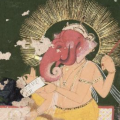My thinking and teaching is centered on the relationship of humans to information technologies—from paper documents to smartphone apps and AI systems. And of course, a deeper theme here is the age-old question of the relationship between humankind and nature.
One way to understand what we humans are doing when we make technology is that we’re constantly encapsulating ourselves from nature, continually adding layers of separation between ourselves and the world around. (This is the view of Luciano Floridi, for example.) It may have started with clothing and shelter, but now we separate ourselves from the world with social media, online shopping, digital entertainment and on and on. And so what does that mean for us? What does it mean for humanity—past, present and future?
One way to explore such questions is through myth. The old stories help us ask the big questions: What do we want? Is it good for us? What will it cost? What are we willing to pay? Is it worth it?
So to help us ask these questions, I want to share a story that I learned from the storyteller Martin Shaw.
It’s late in the lonely afternoon, and a hunter trudges through the forest. Belly stuck to spine, an unsuccessful day. When he comes near to his hut, he sees something that terrifies him: smoke coming out of the chimney. Someone’s inside. Carefully he crept closer, and he discovered that whoever it was, they were gone now. But someone certainly had been there. Inside he found a warm fire and a hot meal. His clothes had been mended and cleaned. He felt something then that he couldn’t quite name. No one had ever cared for him in this way before.
Day after day, the same thing. At the end of the week, the hunter decided to come home early to see who it was who cared for him. He peered through the door, and there he saw a woman with his back to him, cooking at the stove. And he looked at her with his hunter’s eye, and he knew, like all hunters know, that she was not just a woman. She was part woman, part fox, and part spirit. And she knew, like all women know, that she was being watched. She turned around and said to him with authority: “I will be the woman of this hut!”
The hunter knew a good thing when he saw it, and he nodded and said, “Yes.”
“There’s just one thing,” she said. “Being part fox, I have my pelt, and I need to hang it on the inside of the door. Is that going to be all right with you?”
Again he nodded and said, “Yes.”
They had a wonderful night. He told stories and she told jokes and they both sang songs. The hunter’s life changed then—no longer was it so cold and solitary.
But over time, the pelt began to give off a strong, wild smell. You might think it was a small price. But the smell grew more and more pungent as time went on, and the hunter started to complain. “Do you have to keep the damn thing in the house?!” he said. As the months passed, the hunter could smell the wild scent on his pillow, in his clothes, on his own skin—even in his mind. His complaints grew more severe until one day he burst. “I told you before!” he started. “Get—rid—of—the—pelt!”
The woman simply nodded. And in the morning, the woman was gone, and the pelt was gone, and the scent was gone. And the man stood in the doorframe and looked out into the lonely wood, and he felt something that he’d never felt before. And they say that he still stands there, lonely in his whole body, for the scent of the fox woman.
This is what Shaw has to say about the tale:
I would suggest that we are that hunter, societally and most likely personally. The smell of the pelt is the price of real relationship to wild nature; its sharp, regal, undomesticated scent. While that scent is in our hut there can be no Hadrian’s wall between us and the living world.
Martin Shaw, “Turning Our Head from the Pelt“
Somewhere back down the line, the West woke up to the fox woman gone. And when she left she took many stories with her. And, when the day is dimming, and our great successes have been bragged to exhaustion, the West sits, lonely in its whole body for her. Stories that are more than just a dagger between our teeth. More than just a bellow of conquest. As I say, we have lost a lot of housemaking skills for how to welcome such stories. We turned our face away from the pelt. Underneath our wealth, the West is a lonely hunter.
Here Shaw sees the fox woman as wild nature. But the power of myth is in its thickness. We can also see the fox woman as our digital technologies—they do have a certain spirit to them. We have invited them into our lives without considering the costs… and once we are infused with their scent, they cannot be gotten rid of so easily, lest we stand, lonely with our whole body.
Myth, I think, for better or worse, can help us see our questions, and see them differently, but it will be up to us to forge the answers. So—where to from here?
 Follow
Follow

